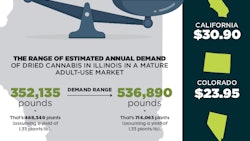
Lt. Gov. John Fetterman is more than halfway through his “marijuana listening tour” of all 67 Pennsylvania counties, where he has found strong support for adult-use cannabis legalization in the state. However, lawmakers’ opposition to policy reform is keeping legalization measures from advancing in the statehouse, according to Karen O’Keefe, director of state policies for the Marijuana Policy Project (MPP).
RELATED: Which U.S. States Are Poised to Legalize Adult-Use Cannabis Next?
“No bills are moving,” O’Keefe told Cannabis Business Times. “The legislature had a committee hearing, where they listened to the lieutenant governor reporting back on his listening tour, and they heard from other witnesses, too, … [but] none of the bills to make marijuana legal and regulate it for adult use are moving forward at this point.”
Senate and House Democrats held a joint public hearing April 19 at the state Capitol to hear testimony from Fetterman, cannabis advocates and lawyers, among others. Fetterman has just a couple weeks left in his state-wide listening tour, O’Keefe said, and he has reported that about 65 percent of the public supports legalization. This mirrors the results of a Franklin and Marshall College poll, released March 28, that found that 59 percent of Pennsylvania’s registered voters believe marijuana should be legal.
In some states, work groups or task forces have been appointed by the legislature or governor to analyze how to legalize and regulate cannabis, but so far, it is unclear whether such an effort will stem from Fetterman’s listening tour in Pennsylvania, O’Keefe said.
“They haven’t said anything, as far as I know, to that effect in Pennsylvania, but that would be one possibility that could happen,” she said. “In addition to the listening tour, they’re soliciting input online, and it’s gotten thousands of comments from people in the state, so I’ll imagine that they’ll take a little bit of time to digest them.”
Gov. Tom Wolf said in December that it is time for the state to consider legalization, and he supports Fetterman’s listening tour, joining the lieutenant governor in January to announce its launch. However, legalization measures introduced this year in the legislature have not gained much traction, O’Keefe said.
In February, State Rep. Jake Wheatley introduced HB50 to legalize adult-use cannabis and “address decades of social injustice,” according to a tweet.
In the Senate, Sens. Daylin Leach and Sharif Street introduced SB350 in March to allow residents 21 and older to use cannabis and grow up to six marijuana plants per household for personal use. The measure also allows for cannabis delivery.
“The legislature there has a year-round session, so they don’t have the time pressure that a lot of legislatures do,” O’Keefe said. “The fact that the bills haven’t moved this year in Pennsylvania doesn’t mean that they won’t. That said, the Republican leadership in both chambers has not indicated any openness at all to supporting legalization for adult use. So, until there’s a change of their minds or a change of leadership, the prospects don’t look particularly good. As I recall, Speaker [Mike] Turzai in the House … even was staunchly opposed to medical marijuana.”
While MPP was involved in past medical marijuana legalization efforts in the state, the organization has placed its lobbying efforts elsewhere this year, viewing Pennsylvania as a longshot.
“It will probably take a few years for the bills and the issues to percolate before they start moving,” O’Keefe said. “Mostly this year, our efforts have been sending lots of email alerts to ensure our list and supporters know about the listening tours going on near them so they can have their voices be heard and show there’s a strong majority.”
Momentum continues building toward policy reform, she added, as several cities have passed decriminalization measures, including Philadelphia, Pittsburgh, Harrisburg, State College, York, Erie, Lancaster and Bethlehem.
The state Senate and House seats are up for reelection in 2020, O’Keefe said, and at that point, new leadership may be more receptive to legalization.
“A lot of legislators and even the public as a whole have evolved pretty quickly on the issue,” she said, “but as of yet, it doesn’t look like leadership is interested in letting it come to a vote."

























